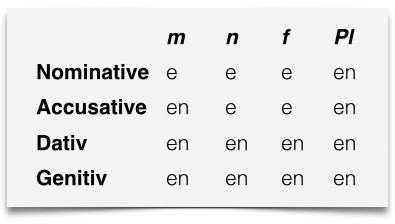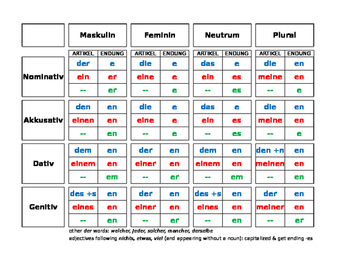
Question 2: Is the article in the standard, unchanged form?

If YES (if there is an article already), move on to question 2. (it would be dies en Kaffee, so we add -en to kalt) (it would be dies es Bier, so we add -es to deutsch) If NO (if there is no article): add the ending that would occur on a der-word for that noun. (Articles are words like der, die, das, ein, mein, unser, dieser, jeder, etc.) Question 1: Does the adjective have an article in front of it? With those guidelines in mind, we can now set up a flow chart of rules that will give you the correct adjective ending.

This distinction will be important in deciding which adjective ending to use. In the sentence "ich sehe ein Buch", however, the neuter accusative ein does not differ from its nominative form, which is also ein. For example, in the sentence "ich sehe einen Mann", einen shows clearly that Mann is no longer in the nominative case. Keep in mind 2: Some articles show that a noun has changed from its original nominative case, others do not. For example, der Mann clearly shows that Mann is masculine ein Mann, on the other hand, does not show this, because ein could also be applied to a neuter noun ( ein Kind). Keep in mind 1: Something - either an article ( der/ein/dieser/etc.) or the adjective itself - must show what gender the noun is. (I don't.) Instead, let's try to approach adjective endings from a more logic-oriented framework, with a set of rules. There are many ways to understand and learn adjective endings: if you were to simply memorize a chart, you would need to memorize 48 different possible combinations - but it would work, if that's what you prefer. If an adjective does not precede a noun, but rather occurs as a descriptive adjective after the noun, then it does not have any ending. All attributive adjectives - that is, adjectives that precede a noun which they modify - MUST show declension, i.e. There are two ways to use adjectives in a sentence: as a descriptive adjective ("the house is nice"), or as an attributive adjective ("it is a nice house"). With some effort, you should be able to put the correct endings on adjectives without having to refer to a massive diagram or chart. Yes, they do require some memorization, but there is a logic to them.

I can't make them fun, but I can at least make them a little easier. Handout: Adjektivendungen BACK TO GRAMMAR WORKSHEETSĪdjective endings are usually the least favorite part of learning German, from both the students' and the teacher's viewpoints.


 0 kommentar(er)
0 kommentar(er)
